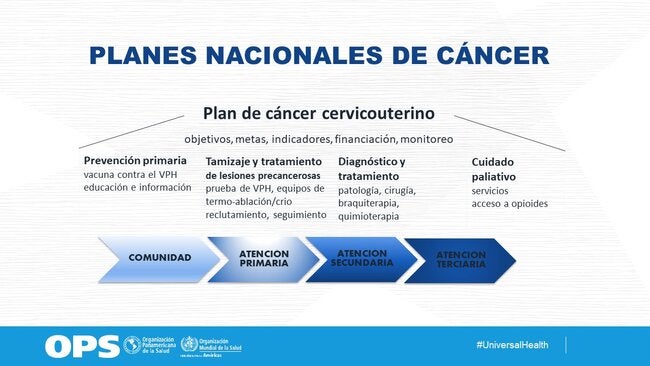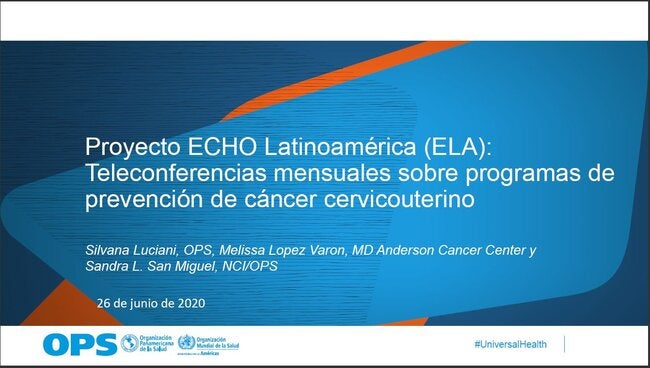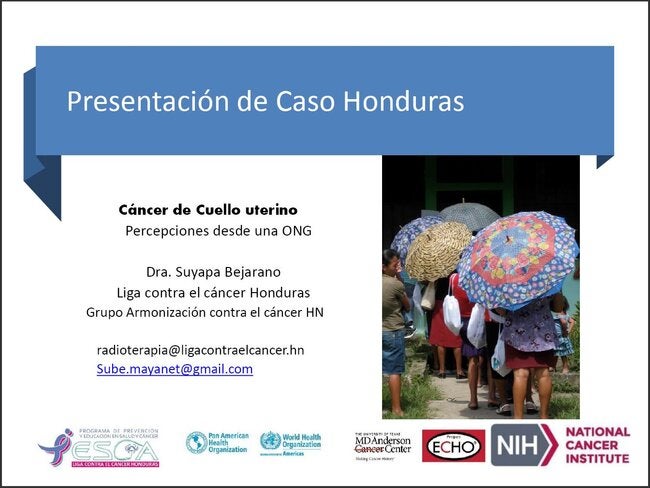The second meeting for ECHO Latin America ELA Project: Monthly teleconferences about cervical cancer prevention and control programs took place on Friday, June 26, 2020.
During the meeting, ECHO ELA Project collaborators Silvana Luciani, Pan American Health Organization (PAHO), Melissa Lopez Varon, MD Anderson Cancer Center (MDACC), Sandra L. San Miguel, National Cancer Institute (NCI), and faculty members, Dr. Silvina Arrossi (Argentina), Dr. Maria Tereza da Costa (PAHO/WDC/Brazil), Dr. Mauricio Maza (El Salvador), and Dr. Mila Salcedo (MDACC/Brazil) welcomed 119 participants, including leaders for national cervical cancer and immunization programs from the Ministries of Health in Latin America, NGO representatives and other professionals working on related projects; Focal Points from each of the PAHO offices in Latin America, PAHO representatives from Washington, D.C., WHO in Geneva, MD Anderson Cancer Center University of Texas, the U.S. National Cancer Institute, and collaborators working on this topic.
The following was covered during the monthly teleconference:
- Program leads emphasized the goal of the ECHO ELA: to help countries develop national plans and achieve cervical cancer elimination goals: goals of 90-70-90 (90% HPV vaccination coverage; 70% HPV screening coverage; and 90% HPV treatment coverage);
- The didactive lecture was presented by Silvana Luciani of PAHO, which focused on ‘The Elimination of Cervical Cancer in the Americas’
- Dr. Suyapa Bejarano and colleagues from Honduras presented the case ‘Cervical Cancer – Perceptions from an NGO.’ The presentation outlined the existing infrastructure and adaptations made due to COVID-19 restrictions. Advocacy and public policy were presented as viable options to improve the current situation. The main barriers that are hindering progress, including cancer literacy, were discussed. Participants were reminded that the ECHO® Project is based on multilateral exchange of knowledge using cases at the epicenter of the discussion.
Discussion:
The group discussed the opportunity to outreach and educate parents and children upon returning to school to reduce stigmatization. The case presented underscored the importance of community work and education models, including pilot models to demonstrate the best strategies that work well in the community. The need to continue funding programs and disseminating health information was also discussed. Likewise, the need for greater intervention by health authorities to provide support at all levels was reiterated. We had a very interactive and enriching dialogue, and this written summary includes the questions, answers, and comments that were made during the meeting. Dr. Chacón and Dr. Morales from El Salvador were also scheduled to present a case during this meeting; however, due to the lack of time, their case will be presented during our next monthly meeting in July.




